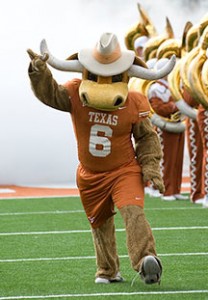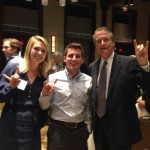A couple of months ago, we all received an invitation to compete in BASF’s Team Chemistry challenge. A fellow MPA student decided to form a group, and so I joined. It seemed like a fun project – come up with ideas to lessen the environmental impact of football gameday. I love football gameday and I have an interest in environmental sustainability, so it was like a match made in heaven. Of course, the incentive of winning a bunch of money didn’t hurt.
a group, and so I joined. It seemed like a fun project – come up with ideas to lessen the environmental impact of football gameday. I love football gameday and I have an interest in environmental sustainability, so it was like a match made in heaven. Of course, the incentive of winning a bunch of money didn’t hurt.
So, we set to work coming up with ideas on how to approach the problem. We easily came up with a host of small solutions that would have some impact, but quickly got bogged down in the details. After spending some more time pondering our work, we decided to focus on a group of related solutions and hone in on them. As Joel said in his most recent article about accountants being risk-averse, we learned from our initial mistakes, found the proper balance, and ended up with some pretty cool ideas.
We were invited to a couple of events by BASF and the Athletic Department to learn more about the initiative and the goals of the competition. One event was a sustainability panel sponsored by UT Engineers for a Sustainable World. The panel was entirely made up of engineers and the audience was entirely engineers … except two of us MPA students. It was very intimidating hearing about them discussing various polymers of which we had no clue of their existence much less their properties. Apparently these students have a big advantage over us with their knowledge of chemicals, considering BASF is essentially a chemical company. The next event was a stadium tour, during which our guides told us about their issues with waste management. Their focus seemed to be only on waste management problems, while our solutions did little to address that.
 But, we pressed on, confident in the power of our ideas despite not having the technical knowledge that is certainly common among our competition. What we do have is a business ingenuity that enabled us to come up with feasible solutions that are easily implemented and have a measurable impact. We used the skills we have learned in economics, finance, and accounting to estimate the results of our proposals. We also used our branding and presentation skills to develop a persuasive format through which to deliver our proposal.
But, we pressed on, confident in the power of our ideas despite not having the technical knowledge that is certainly common among our competition. What we do have is a business ingenuity that enabled us to come up with feasible solutions that are easily implemented and have a measurable impact. We used the skills we have learned in economics, finance, and accounting to estimate the results of our proposals. We also used our branding and presentation skills to develop a persuasive format through which to deliver our proposal.
We find out Friday if we are invited to the finalist round, where we will present and defend our ideas in a “shark tank” environment. We’ve had fun putting it all together, and we’re proud of our accomplishments, but it would be great to get to write a “Part II” to this article about our preparation for the finalist round!


 A few weeks ago, MPAC had an opportunity to hear from a couple local entrepreneurs. It was an insightful conversation as Robert Varela and Kristian Zak of
A few weeks ago, MPAC had an opportunity to hear from a couple local entrepreneurs. It was an insightful conversation as Robert Varela and Kristian Zak of 


